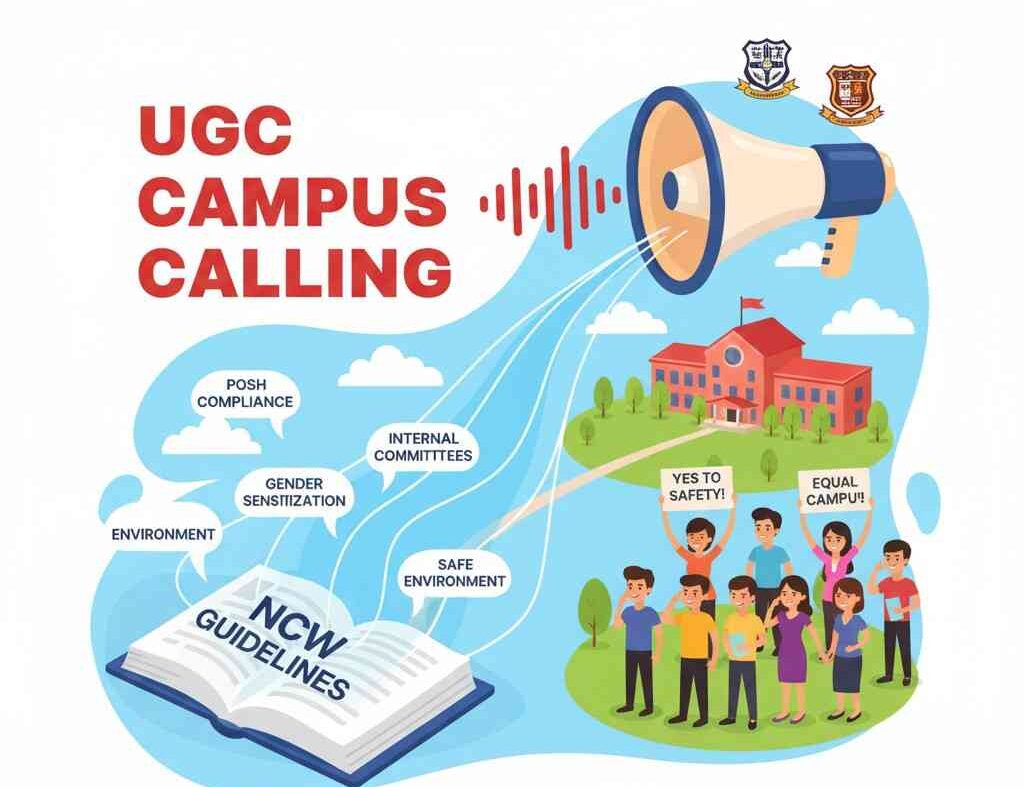The National Commission for Women (NCW) has directed higher education institutions to strictly comply with the POSH Act, 2013. Learn how UGC’s “Campus Calling” initiative strengthens redressal mechanisms, mandates training, and aims to create safer campuses for women across India.
Introduction
The National Commission for Women (NCW) has recently issued a strong advisory urging universities and colleges across India to strictly implement the provisions of the POSH Act (Prevention of Sexual Harassment of Women at Workplace Act, 2013). This renewed push comes after recurring complaints about non-functional Internal Committees (ICs), inadequate awareness activities, and the absence of proper redressal mechanisms in many educational institutions.
Simultaneously, the University Grants Commission (UGC) has activated its regulatory programme called “Campus Calling”, aimed at monitoring compliance, collecting reports, and ensuring that every institution operates a safe and gender-sensitive environment.
Together, these developments mark one of the strongest nationwide moves toward enforcing gender safety within India’s higher education ecosystem.
Why NCW Issued This Directive
The NCW’s call for strict POSH compliance stems from several ongoing challenges:
Non-Functional Internal Committees (ICs)
Many colleges either have inactive committees or lack the legally required composition, which includes:
- A presiding woman officer
- At least two employee members
- One external member familiar with women’s rights
Non-compliance leaves survivors without proper institutional support.
Lack of Awareness and Training
The POSH Act requires regular sensitisation sessions, workshops, and orientation programmes for students, faculty, and administrative staff. Yet several institutions conduct these only on paper, weakening prevention and reporting mechanisms.
Rise in Complaints and Unsafe Campus Environments
Frequent student protests and media reports about harassment cases have highlighted gaps in grievance handling, prompting NCW to demand urgent corrective action.
What UGC’s “Campus Calling” Initiative Means
To strengthen compliance, UGC has launched “Campus Calling”, under which institutions must:
Submit Mandatory Compliance Reports
Every higher-education institution must periodically submit detailed reports indicating:
- Status of Internal Committees
- Training sessions conducted
- Number of complaints received and resolved
- Measures taken to prevent harassment
Ensure Proactive Monitoring
UGC will now cross-verify whether:
- The IC is properly constituted
- Annual reports are submitted on time
- Awareness programmes are genuinely conducted
Conduct Capacity-Building Programmes
UGC encourages institutions to organise training sessions by certified POSH trainers, NGOs, and legal experts to build a culture of respect and gender sensitivity.
What This Means for Colleges and Universities
Mandatory Formation of a Proper Internal Committee
Failure to establish an IC is a violation of the POSH Act and may attract penalties, disciplinary action, and reputational damage.
Regular Training Is Not Optional
Institutions must conduct:
- Orientation for new students
- Workshops for faculty and staff
- Awareness sessions every semester
Transparent and Accessible Complaint Mechanisms
Colleges must ensure:
- Anonymous complaint options
- Clear online and offline reporting systems
- Time-bound inquiry and resolution process
Responsibility of Leadership
Vice-chancellors, principals, and senior administrators will be held accountable for ensuring compliance and functioning redressal mechanisms.
Impact on Students and Campus Culture
The combined efforts of NCW and UGC aim to create:
- Safer, more inclusive campuses
- Increased confidence among women to report harassment
- Greater accountability among faculty and staff
- A culture where gender sensitivity is integral to learning spaces
These steps are expected to reduce incidents of harassment and ensure that higher-education institutions serve as safe environments for academic and personal growth.
Frequently Asked Questions (FAQ) on NCW’s Directive for Strict POSH Compliance in Higher Education
What is the POSH Act?
The POSH Act (2013) is a law that mandates all workplaces—including colleges and universities—to prevent, prohibit, and redress sexual harassment through formal committees and training programmes.
Is the Internal Committee (IC) mandatory for colleges?
Yes. Every institution with 10 or more employees must form an Internal Committee. Failing to do so is a legal violation.
What is UGC’s “Campus Calling” initiative?
It is a monitoring programme where UGC collects compliance reports from institutions and ensures that the POSH Act is fully implemented.
What happens if a college does not follow POSH guidelines?
Colleges may face legal penalties, UGC action, loss of accreditation marks, reputational harm, and potential litigation.
Who can file a complaint under POSH in educational institutions?
Students, faculty, administrative staff, research scholars, and contractual workers can all file complaints of sexual harassment.

























